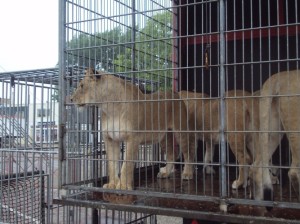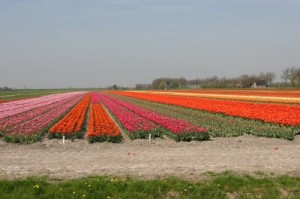Worldlog Semana 52 – 2014
Esta semana se ha conseguido un gran avance en favor del bienestar animal en Holanda. A partir de 2015 está definitivamente prohibida la actuación de animales salvajes en el circo. La medida se ha hecho esperar, porque se anunció en 2012. En México se adoptó esta semana la misma prohibición. Desde la fundación de nuestro partido hemos abogado por la prohibición de animales salvajes en el circo y, por lo tanto, estamos de enhorabuena. Sin embargo, estoy muy sorprendida de que se haya excluido de la prohibición a lamas, alpacas y dromedarios, y vamos a plantear una serie de preguntas al respecto a la secretaria de Estado.
Pero lo que me llama todavía más la atención es la base argumental sobre la que el Gobierno ha anunciado la prohibición: “la diversión del ser humano no puede servir de justificación para menoscabar la dignidad de los animales”. Según esta afirmación, la iniciativa legislativa no viene motivada únicamente por el bienestar animal, sino también por el respeto a los animales. Esto supone un hito en la política gubernamental en materia de bienestar animal, y espero que empiecen a observar también otras cuestiones desde esa misma perspectiva. Nuestro partido, en cualquier caso, va a hacer todo lo posible porque así sea.
¡Y siguen las buenas noticias! El parlamento ha aprobado nuestra moción para limitar el uso de pesticidas en el entorno de espacios naturales. Esto quiere decir que ya no se admiten cultivos de uso intensivo de pesticidas, como los bulbos y otras plantas, en las proximidades de espacios naturales. Una de las funciones del Gobierno determinadas por la ley es impedir actividades perjudiciales para el medioambiente en zonas naturales vulnerables. Sin embargo, hasta el momento no se había tomado ninguna medida contra el cultivo de bulbos, motivo por el cual distintos espacios naturales han sufrido durante mucho tiempo daños derivados del uso de pesticidas, cuando según la legislación se los debería haber protegido. Ahora queda en manos de las provincias la responsabilidad de aplicar las restricciones pertinentes al uso de pesticidas.
La última semana antes del parón navideño ha sido muy movida en la política holandesa. Una mayoría del senado (incluyendo a nuestro senador) votó contra la propuesta de ley para limitar la libertad de elección de médicos. Esta mayoría se formó debido a que tres senadores del Partido de los Trabajadores (PvdA), el cual forma parte de la coalición de gobierno, votaron en contra de la ley de forma imprevista. El PvdA prometió durante su campaña electoral poner freno a la liberalización de la sanidad, y esta propuesta de ley (un deseo explícito del VVD, el partido liberal que forma la coalición con el PvdA) atentaba contra dicho principio. El Gobierno reaccionó enfurecido y ejerció una presión sin precedentes sobre los tres senadores rebeldes para que cambiaran el sentido de su voto y aprobaran el nefasto plan para limitar los derechos de los pacientes. La consecuencia fue una crisis durante la cual se hicieron esfuerzos frenéticos para encontrar una solución.
Sin embargo, esta crisis de Gobierno no es ninguna sorpresa, si consideramos que los dos partidos que forman la coalición de gobierno se encuentran en polos ideológicos opuestos. Pero su deseo de seguir en el poder es tan grande (las encuestas ofrecen en este momento resultados dramáticos para ambas formaciones y dos tercios del electorado no quiere que siga esta coalición) que al final han encontrado una argucia para, si fuera necesario, dejar fuera de juego al parlamento y forzar la aprobación de la propuesta de ley. El debate sobre esta cuestión se prolongó hasta altas horas de la noche.
La política sanitaria actual en Holanda da prioridad al dinero por encima de las personas, lo cual se desprende también del hecho de que el único centro de salud vegetariano para personas mayores del país corre el riesgo de desaparecer. Sobre este asunto he planteado una serie de preguntas parlamentarias.
Según un estudio aparecido esta semana, la emisión de partículas ultrafinas de los aviones es más alta y más nociva de lo que se creía hasta ahora. Además del daño para el medioambiente, las partículas ultrafinas suponen también un riesgo para la salud de las personas que viven en las proximidades del aeropuerto. La secretaria de Estado se ha comprometido ante nosotros a realizar estudios adicionales, pero no se mostró dispuesta a adoptar medidas preventivas, a pesar de lo alarmante de las noticias, por lo que consideramos negligente esa actitud tan pasiva y expectante.
Muy interesante esta entrevista (en inglés) a Tim Jackson, catedrático británico de desarrollo sostenible, sobre el dilema del crecimiento económico. ¿Podemos conservar nuestro nivel de bienestar sin crecimiento económico? Tim Jackson está convencido de que sí, y que además es necesario para proteger el planeta.
http://programma.vpro.nl/gesprekop2/afleveringen/2012/aflevering-7-tim-jackson.html
Ahora que se acercan las fiestas, miembros activos del Partido por los Animales han repartido folletos por toda Holanda con una receta vegetariana y una felicitación navideña respetuosa con los animales. Espero de todo corazón que muchas personas sigan esa recomendación culinaria. ¡Felices fiestas y un próspero y sano 2015!
Marianne
This week, there was a major breakthrough for animal welfare in the Netherlands. As from 2015, it is truly prohibited to make wild animals perform in circuses. This prohibition was announced in 2012 already and it took a long time. The same prohibition was adopted in Mexico this week! Since our foundation we have called for the prohibition of animals in circuses and we are, therefore, very pleased with this result. But I am very surprised that camels, lamas, alpacas and dromedaries do not fall under this prohibition and we will put questions about this to the State Secretary.
But what is even more striking to me is the ground on which the prohibition is imposed: the reason given by the cabinet for the legislative proposal is that entertainment for people cannot justify violation of animal integrity. Thus, not only animal welfare but also respect for the animal itself is the basis for a legal act to ban performances with animals. This marks a milestone in the government’s policy on animal welfare and I hope that they will look at other issues the same way. We will work hard to achieve this in any case!
More good news! A majority of the Lower House voted in favour of our motion to curtail the use of toxins around nature areas. The growing of bulbs and other cultivations for which large amounts of toxins are used will no longer be permitted unjustifiably. Although, by law, the government has the task to eliminate damaging activities in vulnerable nature areas, it did not yet interfere with the growing of bulbs. This way, toxic pesticides have damaged nature areas for years, while in fact they should have been protected. It is now up to the provinces to restrain the use of toxins.
The last week before the Christmas recess was an eventful week in Dutch politics. The Senate (including our Senator) voted against the legislative proposal that limits the free choice of doctors. The majority arose because three senators of the governing party the Labour Party (LP) unexpectedly voted against the proposal. The LP promised during the elections that it would stop market forces in the care sector, and this legislative proposal (the wish of the coalition party People’s Party for Freedom and Democracy (PPFD)) is contrary to this promise. The Cabinet was furious and exerted unprecedented pressure on the people’s representation to still say yes to the ill-fated plan to affect the patients’ law. A crisis followed, and they diligently searched for a solution.
The cabinet crisis is not surprising. The governing parties are each other’s ideological counterparties. The wish to continue to govern (they both are dramatically low in the opinion polls, two third of the voters no longer want this government) is so great that in the end they came up with a trick that would sideline the parliament, if necessary, to push the legislative proposal through. The debate on this went on till early in the morning.
The focus is on money instead of people in the current Dutch care policy. This is also evident from the threat to close the only vegetarian care centre for the elderly in the Netherlands. I have, therefore, asked parliamentary questions on this.
This week, research showed that the emission of ultrafine particles by aircrafts is much higher and more harmful than thought. In addition to environmental pollution, it also causes health risks for people living in the direct vicinity. The State Secretary promised us to be willing to conduct follow-up research, but was not prepared to take precautionary measures. These reports are however very alarming and the wait-and-see policy is highly negligent!
This interview with the British professor of sustainable developments on the dilemma of economic growth is very interesting to watch. Can we maintain our welfare without economic growth? Tim Jackson is convinced that we can, and that it should be done in the interest of the earth.
With the festive season coming up, many active members of the Party for the Animals handed out flyers in the Netherlands with a vegetable recipe and animal-friendly Christmas greetings. I sincerely hope that many people will respond to this and I wish you all a merry Christmas and a healthy, happy 2015.
Marianne

